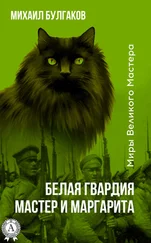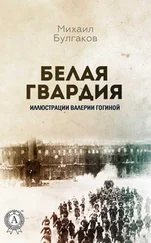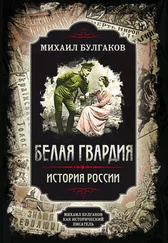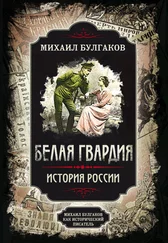| It was one of simple human delight in warmth, light and safety. |
В верхнем слое простая человеческая радость от тепла, света и безопасности. |
| But deeper down was plain fear, which Talberg had brought with him on entering the house. |
А вот поглубже - ясная тревога, и привез ее Тальберг с собою только что. |
| As always, the deepest layer of all was, of course, hidden, although naturally nothing showed on Talberg's face. |
Самое же глубокое было, конечно, скрыто, как всегда. Во всяком случае, на фигуре Сергея Ивановича ничего не отразилось. |
| Broad, tightly- |
Пояс широк и тверд. |
| buckled belt; his two white graduation badges - the university and military academy - shining bravely on his tunic. |
Оба значка - академии и университета - белыми головками сияют ровно. |
| Beneath the black clock on the wall his sunburned face turned from side to side like an automaton. |
Поджарая фигура поворачивается под черными часами, как автомат. |
| Although Talberg was extremely cold, he smiled benevolently round at them all. |
Тальберг очень озяб, но улыбается всем благосклонно. |
| But there was fear even in his benevolence. |
И в благосклонности тоже сказалась тревога. |
| Nikolka, his long nose twitching, was the first to sense this. |
Николка, шмыгнув длинным носом, первый заметил это. |
| In a slow drawl Talberg gave an amusing description of how he had been in command of a train carrying money to the provinces, how it had been attacked by God knows who somewhere about thirty miles outside the City. |
Тальберг, вытягивая слова, медленно и весело рассказал, как на поезд, который вез деньги в провинцию и который он конвоировал, у Бородянки, в сорока верстах от Города, напали -неизвестно кто! |
| Elena screwed up her eyes in horror and clutched at Talberg's badges, the brothers made suitable exclamations and Myshlaevsky snored on, dead to the world, showing three gold-capped teeth. |
Елена в ужасе жмурилась, жалась к значкам, братья опять вскрикивали "ну-ну", а Мышлаевский мертво храпел, показывая три золотых коронки. |
| 'Who were they? |
- Кто ж такие? |
| Petlyura's?' |
Петлюра? |
| 'Well if they were,' said Talberg, smiling condescendingly yet nervously, 'it's unlikely that I would be . . . er . . . talking to you now. |
- Ну, если бы Петлюра, - снисходительно и в то же время тревожно улыбнувшись, молвил Тальберг, - вряд ли я бы здесь беседовал... э... с вами. |
| I don't know who they were. |
Не знаю кто. |
| They may just have been a stray bunch of Nationalists. |
Возможно, разложившиеся сердюки. |
| They climbed all over the train, waving their rifles and shouting |
Ворвались в вагоны, винтовками взмахивают, кричат! |
| "Whose train is this?" |
"Чей конвой?" |
| So I answered |
Я ответил: |
| "Nationalist". Well, they hung around for a while longer, then I heard somebody order them off the train and they all vanished. |
"Сердюки", - они потоптались, потоптались, потом слышу команду: "Слазь, хлопцы!" И все исчезли. |
| I suppose they were looking for officers. They probably thought the escort wasn't Ukrainian at all but manned by loyalist Russian officers.' Talberg nodded meaningfully towards the chevron on Nikolka's sleeve, glanced at his watch and added unexpectedly: 'Elena, I must have a word with you in our room ...' |
Я полагаю, что они искали офицеров, вероятно, они думали, что конвой не украинский, а офицерский, - Тальберг выразительно покосился на Николкин шеврон, глянул на часы и неожиданно добавил: - Елена, пойдем-ка на пару слов... |
| Elena hastily followed him out into the bedroom in the Talbergs' half of the apartment, where above the bed a falcon sat perched on the Tsar's white sleeve, where a green-shaded lamp glowed softly on Elena's writing desk and on the mahogany bedside table a pair of bronze shepherds supported the clock which played a gavotte every three hours. |
Елена торопливо ушла вслед за ним на половину Тальбергов в спальню, где на стене над кроватью сидел сокол на белой рукавице, где мягко горела зеленая лампа на письменном столе Елены и стояли на тумбе красного дерева бронзовые пастушки на фронтоне часов, играющих каждые три часа гавот. |
| With an incredible effort Nikolka succeeded in wakening Myshlaevsky, who staggered down the passage, twice crashing into doorways, and fell asleep again in the bath. |
Неимоверных усилий стоило Николке разбудить Мышлаевского. Тот по дороге шатался, два раза с грохотом зацепился за двери и в ванне заснул. |
| Nikolka kept watch on him to make sure that he did not drown. |
Николка дежурил возле него, чтобы он не утонул. |
| Alexei Turbin, without conscious reason, paced up and down the dark living-room, pressed his face to the windowpane and listened: once again, from far away and muffled as though in cotton wool came the occasional distant harmless rumble of gunfire. |
Турбин же старший, сам не зная зачем, прошел в темную гостиную, прижался к окну и слушал: опять далеко, глухо, как в вату, и безобидно бухали пушки, редко и далеко. |
| Elena, auburn-haired, had aged and grown uglier in a moment. |
Елена рыжеватая сразу постарела и подурнела. |
| Eyes reddened, her arms dangling at her sides she listened miserably to what Talberg had to say. |
Глаза красные. Свесив руки, печально она слушала Тальберга. |
| As stiff as though he were on parade he towered over her and said implacably: |
Он сухой штабной колонной возвышался над ней и говорил неумолимо: |
| "There is no alternative, Elena.' |
- Елена, никак иначе поступить нельзя. |
| Reconciled to the inevitable, Elena said: |
Тогда Елена, помирившись с неизбежным, сказала так: |
| ' Oh, I understand. |
- Что ж, я понимаю. |
| You're right, of course. |
Ты, конечно, прав. |
| In five or six days, d'you think? |
Через дней пять-шесть, а? |
| Perhaps the situation may have changed for the better by then?' |
Может, положение еще изменится к лучшему? |
| Here Talberg found himself in difficulty. |
Тут Тальбергу пришлось трудно. |
| Even his patient, everlasting smile disappeared from his face. |
И даже свою вечную патентованную улыбку он убрал с лица. |
| His face, too, had aged; every line in it showed that his mind was made up. |
Оно постарело, и в каждой точке была совершенно решенная дума. |
| Elena's hope that they could leave together in five or six days was pathetically false and ill-founded . . . |
Елена... Елена. Ах, неверная, зыбкая надежда... Дней пять... шесть... |




![Михаил Булгаков - Белая гвардия [litres; с иллюстрациями В. Гогиной]](/books/400111/mihail-bulgakov-belaya-gvardiya-litres-s-illyustrac-thumb.webp)
